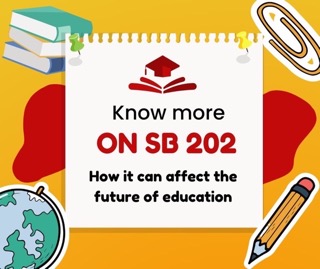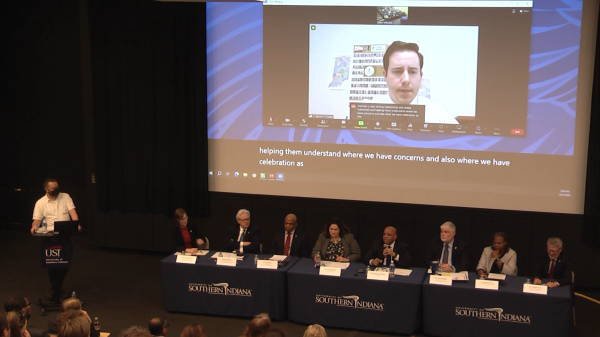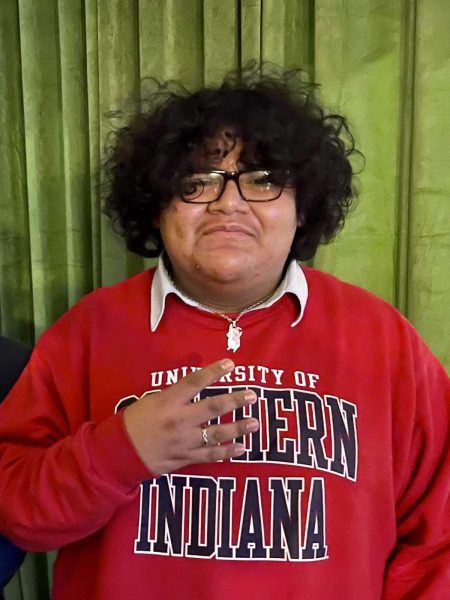
Gov. Eric Holcomb signed Senate Bill 202, which addresses state educational institution matters, March 13. SB 202 is set to go into effect July 1 prohibits faculty members from being promoted or given tenure if they have not supported free expression and intellectual diversity or if they have taught students about political beliefs unrelated to their field of study. This mandate requires institutions and their trustee boards to create guidelines that include policies for the tenure process. Those who already have tenure are to be evaluated every five years to see if they allow unbalanced material drawn from different ideological or political systems into their lesson plans or philosophies.
It is not yet clear how this bill will be implemented at USI.
In its story “Conservative-friendly higher education legislation clears Senate,” the Indiana Capital Chronicle reported that universities could be looking at serious harm. It said, “Opponents, however, argued the proposed changes could harm students and faculty members, or would overly burden public institutions. Those include Ball State University, Indiana University, Indiana State University, Ivy Tech Community College, Purdue University, the University of Southern Indiana and Vincennes University.”
Concerns about academic freedom and integrity being threatened have risen.
Nicholas LaRowe, associate professor of political science, said he does not think SB 202 is a good policy. He said he has concerns about how this could be implemented on campus, particularly in terms of how it will tie to tenure.
“The bill has a post-tenure review of faculty for political bias in the classroom, and that will be part of the review process that faculty go through,” LaRowe said. “And so that could either be really strictly how that’s written, what counts as political bias, who reviews it, how stringent they are, how close attention the Board of Trustees and other administration pays to things like this, how active students are in lodging complaints, I think make all the difference in the world between this being just a formality and it being a serious problem that faculty are going to have to deal with.”
LaRowe said he is not worried about how this could affect his teaching because he does not share his political views in the classroom.
“I try to just teach the literature,” LaRowe said. “And so no, I haven’t spent a lot of time personally worrying about it.”
LaRowe said USI is a far different campus with a far different culture than Indiana University Bloomington or Purdue University, but he does not think the bill itself will not be popular at any particular university.
“But as far as fostering free inquiry and campuses without bias and how they’re run, I think that has more to do with the kind of the culture that the administration creates than this particular law is going to do,” he said.
LaRowe said the university adheres to the Chicago Statement of Free Speech. The speech is known as the Kalven Report and states that universities should stand for free speech and try to pursue the truth.
He said the university aligns itself with these Chicago principles.
“You’ve seen a lot of other universities who have gotten themselves in hot water within the last year or so, kind of going back to or adopting those principles is kind of a good way to go,” LaRowe said. “And so I think USI does a good job. I don’t think that we have any problems with that type of stuff here, and I think that’s because we fostered a good culture of truth-seeking and then free speech and inquiry at USI.”
Trent Engbers, associate professor of political science and public administration, said he is “pretty neutral” on SB 202 being passed.
“I don’t think it’s going to really have any sort of effect,” he said. “But I am also concerned that there might be some chilling effect in terms of the state’s ability to attract top talent who may have concerns about it.”
Engbers said the enforcement mechanisms of the bill are not particularly strong.
“I feel like faculty and students already had pretty healthy free speech protections,” he said. “I think the role of this bill is much more symbolic. I think communities have a vested interest in projecting community values. And I think that this bill has a symbolic role to that end.”
LaRowe said SB 202 has the potential to threaten academic freedom.
“It’s against the law to jaywalk,” LaRowe said. “How many people get in trouble for that? Almost nobody. It’s out there. It’s a law, it could be enforced. But it’s not really enforced, and we’ll see how this law takes life. I think that’ll be the important thing. So it has the potential. It could go anywhere from a really bad policy that’s harmful to the equivalent of jaywalking laws.”
Denise Lynn, interim chair of the history department, professor of history, director of gender studies and director of the Africana studies program, said the university’s academic freedom is being threatened. She said programs that she is affiliated with are being targeted, and that does not sit right with her.
“As director of programs like the gender and sexuality studies program and the Africana studies program, these are particular programs that the legislature is targeting, and these are programs and classes that are popular with young people and students on campus,” Lynn said.
According to the MyFloridaHouse website, Senate Bill 148, or the “STOP WOKE Act,” was on the agenda Jan. 18, 2022, and put into effect July 1, 2022. The bill states that it is unlawful to require training or participation in activities that advance particular ideologies in order to get employment, membership or certification.
An article from CBS News Miami reported, “The new law bans the use of taxpayer money to fund programs that promote ‘differential or preferential treatment of individuals, or classifies such individuals on the basis of race, color, sex, national origin, gender identity, or sexual orientation.’ It also forbids instruction of theories that ‘systemic racism, sexism, oppression, and privilege are inherent in the institutions of the United States and were created to maintain social, political, and economic inequities.’”
Lynn said the state legislature wants Diversity, Equity and Inclusion programs gone.
“They want to get rid of Gender and Sexuality Studies,” Lynn said. “They want to get rid of Africana Studies. That’s exactly what they want, so we are across campus concerned about that. We have a Multicultural Center on campus. Do they want to get rid of that?”
Lynn said she thinks they want the university statement that appeals to a diverse student body and faculty gone as well.
“We already have a hard time recruiting and retaining students and faculty of color,” Lynn said. “I’m very deeply concerned about that. I’m on the LGBTQ Advisory Committee for campus, we just started having pride on campus two years ago. Is this something that they don’t want?”
Lynn said SB 202 makes it unclear what could be taken off campus, and the legislature isn’t speaking up on what it is they want.
According to CBS News Miami, Ron Don DeSantis, governor of Florida, said diversity, equity and inclusion efforts are encouraging “radical ideologies” and “liberal orthodoxy.”
Lynn said this bill is concerning if the state wants to restrict what teachers can and cannot teach in the classroom. She also said it could cause a problem with bringing in more students and hiring teachers due to freedom of expression already being compromised.
“Why do students want to come to a place where they’re not going to be welcomed and have actual free expression?” she said. “So the governor is saying we can have free expression, but what about LGBTQ students that don’t feel safe? What about students of color that don’t feel safe, right? We have concerns about recruiting and retaining students. The other thing would be recruiting and retaining faculty members. Why would someone come to teach at an Indiana institution where there is a state law that says you can’t broach specific topics in the classroom, right?”
Lynn said another concern she has is not others potentially wanting to feed students false information. She said climate change is an example, and that scientists do not reject this, but some politicians do. She said history is built on hard evidence, not conspiracy or pseudoscience, and in the case that lesson plans need to be changed, the possibility of adding views such as the rejection of climate change could be imminent. Lynn said professors would then end up feeding students false information.

USI held an employee town hall meeting Feb. 27, during which SB 202 was discussed. President Ronald Rochon and Aaron Trump, vice president for government affairs and general counsel, talked about what the SB 202 bill would mean for USI’s future.
Rochon said he would not make a public statement about the bill.
Rochon said the institution has developed a solid “methodology” for maintaining a good stance with elected officials.
When Trump took to the floor for a discussion, Rochon said, “It became very clear by virtue of interaction that some form of this bill was going to pass. Without question. And this was becoming more and more clear to us as we were working through the state house process.”
Andrew Buck, chair of sociology and associate professor of sociology, said Trump is the liaison between the university, the Senate and the government body.
He said, from his understanding, many universities rejected being a part of any discussion regarding this bill.
“But Aaron Trump has been involved in the bill, and he’s been helping shape the bill, which has some good factors for us, and just in terms of that someone from a university was involved in the making of the bill,” Buck said.
Buck said he knows his colleagues are open-minded and are not afraid to discuss various positions.
Trump said the bill underwent many stages throughout the process.
“There were about thirty or so amendments filed,” Trump said. “10 passed, and so the language had been adjusted quite a bit over the last five, six weeks.”
Trump also said there are a few things that are no longer a part of SB 202, including complaints and appeals from outsiders as well as mentoring.
People not affiliated with the university would have been able to lodge complaints concerning policies introduced by SB 202. In addition, they would be able to file appeals to have boards reconsider the termination of a faculty member under examination. Mentoring and activities tied to said mentoring were also removed, meaning that before, time spent off campus or outside of class with students would have been taken into account during an examination of any tenure review and process.
Trump said he is not pleased with where the bill went as far as the invasiveness of the tenure process.
“The feedback we always get is, ‘We are very happy with USI! USI is doing good work!’” he said. “This isn’t about USI, but the reality is if they have a problem with one campus, they put it into code to impact all campuses.”
“I think the approach we’ve taken to have private conversations with these legislators and offer them draft amendment language has been more effective than some of the rhetoric that I think has come from some of the other institutions, where ultimately they didn’t have any success getting any of the amendments, where I think my efforts along with Ivy Tech, Purdue and Ball State behind the scenes, we wrote at least the language adjusted not to where we wanted it, but to where we can at least find ways to work with it within our current culture,” Trump said.


